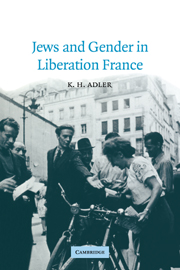Book contents
- Frontmatter
- Contents
- List of illustrations
- Abbreviations
- Acknowledgements
- 1 Introduction: the long liberation
- 2 Narrating liberation
- 3 Anticipating liberation: the gendered nation in print
- 4 Limiting liberation: ‘the French for France’
- 5 Controlling liberation: Georges Mauco and a population fit for France
- 6 Liberation in place: Jewish women in the city
- 7 Conclusion
- Notes
- Bibliography
- Index
- Studies in the Social and Cultural History of Modern Warfare
3 - Anticipating liberation: the gendered nation in print
Published online by Cambridge University Press: 04 July 2009
- Frontmatter
- Contents
- List of illustrations
- Abbreviations
- Acknowledgements
- 1 Introduction: the long liberation
- 2 Narrating liberation
- 3 Anticipating liberation: the gendered nation in print
- 4 Limiting liberation: ‘the French for France’
- 5 Controlling liberation: Georges Mauco and a population fit for France
- 6 Liberation in place: Jewish women in the city
- 7 Conclusion
- Notes
- Bibliography
- Index
- Studies in the Social and Cultural History of Modern Warfare
Summary
Late in 1943, when the all-male Fédération Nationale de la Presse Clandestine was founded within the resistance Mouvement de Libération Nationale (MLN), there was plain agreement on what the resistance press was, and that indeed a coherent genre of clandestine journalism existed. When people found the first home-made leaflets protesting against the occupation in their letterboxes, it is doubtful that any such grandiose or collective notions were at play that would permit either actors or recipients to conceive of their work as unified. Nor is it likely in 1940 that many regarded the roughly copied single sheets as journalism inasmuch as they were neither for sale nor did they much resemble newspapers. But in an environment of censorship and the suppression of communications between the different zones, information became as scarce as other goods. People read the clandestine press as much for news that was otherwise impossible to obtain as for the fulfilment of their desire for comment coloured by a politics they shared. The latter is a standard attribute of the press, whether published under conditions of relative freedom or not. The clandestine press also performed a third, but equally important function: it helped to instrumentalize and confirm readers' opposition to the occupation.
Aspirational liberationism — what France would look like after the occupation — was repeatedly exposed in clandestine literature. Alongside aversion to the current regime it discussed a liberated political and social future at a time when this could only be fantasy.
- Type
- Chapter
- Information
- Jews and Gender in Liberation France , pp. 30 - 67Publisher: Cambridge University PressPrint publication year: 2003



